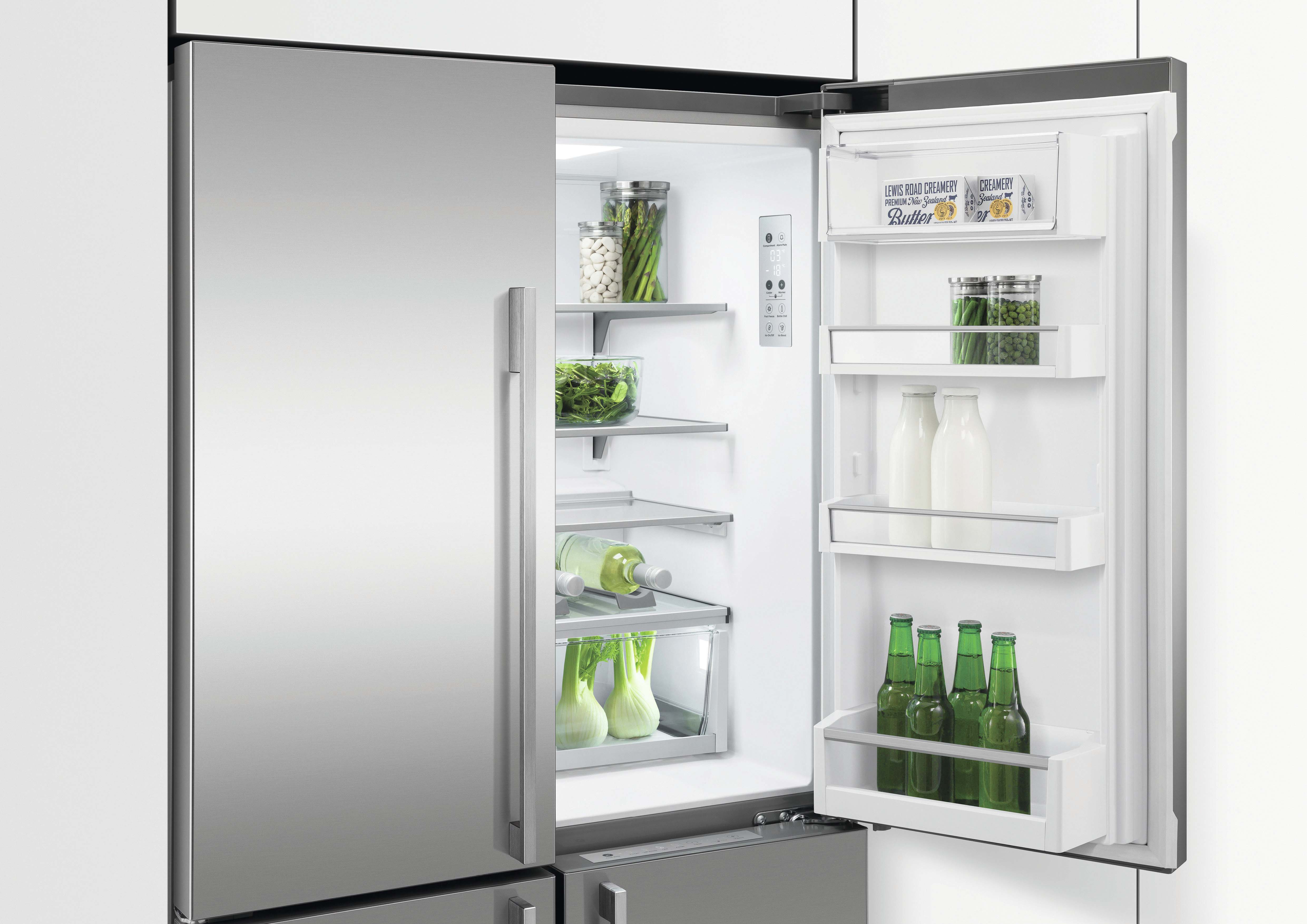Why does my fridge leak water? 5 reasons why, and easy DIY fixes
Do you find yourself wondering why your fridge leaks water on a regular basis? Here, we tell you why, and how to fix it


Design expertise in your inbox – from inspiring decorating ideas and beautiful celebrity homes to practical gardening advice and shopping round-ups.
You are now subscribed
Your newsletter sign-up was successful
Want to add more newsletters?

Twice a week
Homes&Gardens
The ultimate interior design resource from the world's leading experts - discover inspiring decorating ideas, color scheming know-how, garden inspiration and shopping expertise.

Once a week
In The Loop from Next In Design
Members of the Next in Design Circle will receive In the Loop, our weekly email filled with trade news, names to know and spotlight moments. Together we’re building a brighter design future.

Twice a week
Cucina
Whether you’re passionate about hosting exquisite dinners, experimenting with culinary trends, or perfecting your kitchen's design with timeless elegance and innovative functionality, this newsletter is here to inspire
Are you wondering why your fridge is leaking water? It's a common, and annoying, problem, can ruin food, makes the bottom of the fridge and the individual shelves gloopy, and isn't good for hygiene, but it should be easy to fix.
And happily, stopping your fridge from leaking water in the future can become part of your weekly routine when cleaning a refrigerator before loading new groceries into it.
Below, refrigeration experts advise on why your fridge leaks water, and how to fix it, fast.
Why does my fridge leak water?
You might think that a fridge that leaks water is the sign of a faulty appliance. It's far more likely, though that the water puddling in your fridge is the cause of a blocked defrost drain or water supply line.
However, there are a couple of other reasons why. So, if you've noticed water dripping to the bottom when organizing your refrigerator, or puddling beneath it, here are the causes and easy fixes, step-by-step.
1. The defrost drain is blocked
A clogged defrost drain is the most likely cause of your fridge leaking water. It's likely blocked with food debris, which then causes a buildup of water, which then turns to ice. This stops any condensation in the fridge draining out; instead, it pools at the bottom of the fridge or on the shelves, soaking and ruining the food stored on them.
'As part of the normal cooling process, condensation and frost can build up on the back wall of the refrigerator section whilst the compressor is running. You do not need to remove this, as it will defrost and evaporate automatically with the warmth generated by the compressor. The condensation drains through a channel and drain pipe into an evaporation system at the back of the refrigeration appliance, ' explains Sophie Lane, Product Training Manager at Miele.
Design expertise in your inbox – from inspiring decorating ideas and beautiful celebrity homes to practical gardening advice and shopping round-ups.
'To prevent water forming inside the appliance, make sure you're cleaning the drain hole frequently. You can clean this with a soft straw or pipe cleaner for the best results.'
If this doesn't work, you can try flushing the fridge drain with warm water, using a pipette or meat baster. Failing that, you may need to pull your fridge out from the wall, find the defrost drain hose and clean out its rubber check valve, which might be where the blockage is.
2. The water supply line is clogged
If there is watering puddling beneath your fridge or if your ice maker isn't working properly, it's likely that the water supply line is blocked. The water supply line is what delivers both chilled water and ice to the drinks' dispenser on your refrigerator. If it has become clogged or is torn, it will need a quick fix.
'To clear a frozen water supply line, unplug the refrigerator and then check that the shut-off valve is closed without any leaks or kinks,' advises Jo Jackson, Market Product Manager at Fisher & Paykel. 'This valve can usually be located underneath the sink or behind the refrigerator. Very often, ice will be responsible for the blockage, so the refrigerator will need to remain off for two hours while it defrosts. In the case of a tear in the supply line, this is cheap to replace with a new one and easy to reinstall.'
Look for any other reason for the blockage, too, including kinks in the line.
5. Unsealed drinks are leaking
'It sounds basic, but first and foremost check that any liquids in the fridge are sealed and that none of your food is the cause of a liquid problem,' advises Mark Greig, head of supplier management at nationwide electrical appliance retailer, Marks Electrical.
4. The fridge is sitting unevenly
Refrigerators are usually installed with the front end slightly raised; this allows the coolant to flow, meaning that condensation doesn't build up, and subsequent puddles beneath the fridge. However, if your fridge is off kilter, especially if it is leaning forwards, it is likely that condensation is building up and causing your fridge to leak water.
'You may want to double-check that your fridge is on a level surface and isn’t unbalanced in any way,' advises Mark Greig from Marks Electrical. 'If it is, the seal on your door may not be closing correctly and condensed water won’t be leaving down the drainage hole, so ensure to check the fridge legs are adjusted correctly – if correct, when you leave the door ajar it should slowly close on its own.'
5. The door has been left open or its seal is faulty
'If the fridge is leaking water and doesn't seem cold enough, it may be that the door is not closing properly because of a build up of ice,' say the experts at Love Energy Savings.
'Remove all items and thoroughly defrost the fridge freezer in order to rectify this problem. This task should be undertaken around every six months in order to ensure the fridge is running as efficiently as possible.'
Or perhaps the seal on your fridge has become tired and worn, meaning the fridge door is never properly closed? In which case, a new seal will be needed, which you will need to source from your refrigerator's manufacturer.
'First ensure it is clear of any debris,' advises Mark Greig from Marks Electrical. 'You can give them a quick vacuum and a wipe with some soapy water. If it is dirty in any way this could prevent the door from sealing which will create condensation and a leak.'
Or perhaps someone in your household never shuts it properly?
Where is the fridge drain hole?
The fridge drain hole is usually on the back wall of the refrigerator, at or near the bottom. It is a small, central hole with sloped ridges leading down to it delivering the moisture that drips down the back of the fridge.
What to do if your fridge won't stop leaking water
If you have checked the drain hole, the water supply, lidded bottles, the door seal and the fridge's position, it might be time to call in the professionals. Usually, it is best to contact your manufacturer first to see if your fridge is within its guarantee period, in which case you shouldn't be charged for the fix or the condemnation of an old appliance.

Lola Houlton is a news writer for Homes & Gardens. She has been writing content for Future PLC for the past six years, in particular Homes & Gardens, Real Homes and GardeningEtc. She writes on a broad range of subjects, including practical household advice, recipe articles, and product reviews, working closely with experts in their fields to cover everything from heating to home organization through to house plants. Lola is a graduate, who completed her degree in Psychology at the University of Sussex. She has also spent some time working at the BBC.